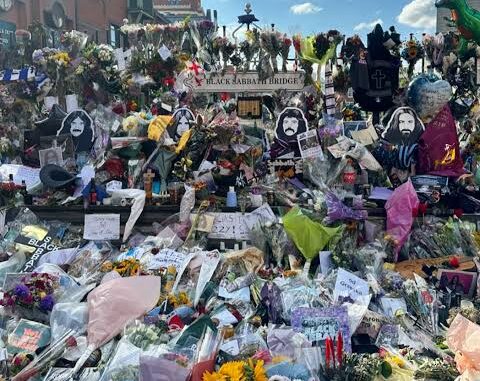
The “home of metal” is honoring one of its most cherished sons.
Thousands of Black Sabbath fans were paying their respects Wednesday to frontman Ozzy Osbourne as his hearse made its way through the streets of Birmingham, the English city where he grew up and where the band was formed in 1968.
The hearse carrying Osbourne, who died last Tuesday at the age of 76, was making its way down Broad Street, the city’s major thoroughfare, to the Black Sabbath bench, which was unveiled on the Broad Street canal bridge in 20
19.
Ozzy, Ozzy, Ozzy, oi, oi, oi,” fans screamed as the hearse arrived.
Six vehicles carrying the Osbourne family, who paid for the procession, followed. The family emerged briefly, with his wife of 43 years Sharon visibly moved
Long-time fan Antony Hunt said it has been an “emotional” day and that he wanted to be in the city to pay his respects.
“What’s amazing is there’s so many, such a wide variety of age groups, from little, little children, teenagers to people in their 60s, 70s, so it’s great to see that,” he said.
Since Osbourne’s death was announced, fans have made pilgrimages to sites around Birmingham, which has embraced its reputation as the birthplace of heavy metal. Among his peers, the singer was metal’s godfather.
“Ozzy was more than a music legend – he was a son of Birmingham,” said city official Zafar Iqbal. “We know how much this moment will mean to his fans.”
Osbourne and his Black Sabbath bandmates, Terence Butler, Tony Iommi and Bill Ward, were recently awarded the Freedom of the City in recognition of their services to Birmingham.
Black Sabbath’s story began in Birmingham in 1968 when the four original members were looking to escape a life of factory work. Without doubt, the sound and fury of heavy metal had its roots in the city’s manufacturing heritage. Osbourne never forgot his working-class roots, and his Brummie accent remained.
Black Sabbath has been widely credited with defining and popularizing the sound of heavy metal – aggressive, but full of melodies.
Osbourne was the band’s frontman during its peak period in the 1970s.
Leave a Reply